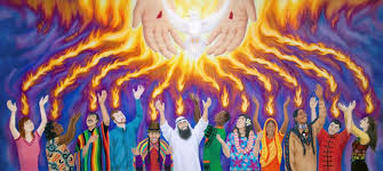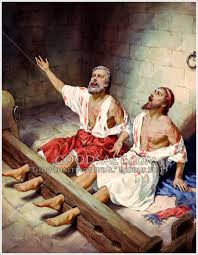
Come Holy Spirit, come!
Come Holy Spirit, come!
Come Holy Spirit, fill our hearts with the Spirit of Jesus, open our hearts to Jesus, speaking the truth of Jesus, following the footsteps of Jesus, serving each other and our community with the love of Jesus – yes, come Spirit come!
Our Pentecost story begins this morning in the most unusual manner: with the passage about the Tower of Babel. What on earth does the Tower of Babel have to do with Pentecost? Let us take a closer look.
We come to the Tower of Babel and find, unlike in earlier chapters of Genesis, the people are unified. One language. Same words. Settled in one place. They say – “come let us make bricks… let us build ourselves a city, and a tower with its top in the heavens and let us make a name for ourselves, otherwise we shall be scattered abroad upon the face of the whole earth.”
For the first time in Genesis we read a story that seems to be positive. People coming together. Cooperating. No one is cursing. No killing. No jealousy. No one is blaming anyone else. No one is boasting about murdering someone else. No one’s getting drunk and naked. So why isn’t God happy for once?
In the story of Babel, there is communication among the people. But there is not a single instance of communication between the people and God. The people take action and God is not consulted. Now this is a first.
In an act that is reminiscent of God’s creation of humanity from the dust of the earth, the people make bricks. They build a city. And they build a great tower to reach the heavens that will be so grand that they plan to make a name for themselves. These ancient towers were special shrines, supposedly homes to the gods. But the builders of Babel wanted more. They wanted to be remembered for this accomplishment. They will be called sons and daughters of the gods, as in the ways of old. They build a tower that created their own version of paradise. A different identity. We can do this without you God, thank you very much.
When God creates and names, it is in order to bless and enhance life and for God to be connected to humanity. When the people use their God-given ability to create, it is to move away from God. Usurp God. This Tower of Babel is not to bless, but to seize control, create a separate destiny, to achieve distinction and power outside the purview of God. There is no sense of fruitfulness and goodness inherent in creation as God intended.
So, in a scene reminiscent of Genesis 3, when God walked in the Garden after the disobedience of Adam and Eve. God goes down and walk in the human-made paradise. God sees that the same language, the same words, gathering in the same place, is out of fear and rebellion. It is not true unity. It is uniformity. A uniformity where everyone must sound the same and act the same. From God’s perspective, it is better to be scattered and forced to learn your name, your identity, your purpose and be a blessing, than to live in false security, fear, and speak and act like everyone else, in one great group-speak.
So, in an act of judgment and mercy, God forces the people to scatter. They are forced to leave their version of paradise. But God be praised, that is not the end of the story. Like with every act of human defiance, God provides a new way forward, a way to God’s original blessing: that we be fruitful and multiply – not just in numbers, but in acts of goodness, mercy, kindness and creativity.
So what does the Tower of Babel have to do with Pentecost?
Pentecost, you see, is the antithesis to the Tower of Babel. On the feast of Pentecost, the disciples are gathered as one, in accordance with Jesus’ instructions. They were afraid but did not act on their fear. They were willing to pray together and wait until God acted. They are filled with Holy Spirit, and this Holy Spirit, instead of keeping them cut off, a self-contained group – scatters them out-- sends them forth into the streets. The difference is the disciples through the power of the Holy Spirit understand all the different nationalities present; they speak and the peoples from all around the world could understand the disciple’s message. Dozens of different languages. A New kind of unity was created, a unity only Holy Spirit could create, a unity characterized by the diversity of gifts, skin colors, social status, opinions, of the people of God. This is the Pentecost blessing. The building of a living community of various languages grounded in Holy Spirit power.
On Pentecost, God created a different kind of tower. Not a vertical tower, like the tower of Babel, reaching up to the clouds alone -- but a living, tower which each person, each nationality, each language, is a needed brick – a tower held together by the mortar of the Holy Spirit – building the kingdom of God – forged by deeds of holiness and compassion. A living structure whose mandate is to cover the entire earth, to reach the heavens, not by our making, but by the very power of the Holy Spirit, - sent by God to abide with us and teach us everything that we need to learn, and remind us of all that Jesus taught us about salvation, right living and love of God and neighbor.
In Pentecost - God indeed wants our name to be great – not great to lord it over someone else -- but great in the example of kindness, humility, patience, service. You see, if we follow the story line, soon after the God scattered the people from the Tower of Babel, God called out to Abraham and Sarah, called them on a journey, and promised to make his name great, not by any means Abraham could do, but by God’s grace, in establishing a lineage that would lead to Jesus, at whose Name every knee shall bend, every tongue confess as Lord. Pentecost is a reminder: The Spirit of Jesus is with us and leads us out of the Babels of our lives to new community, where we love and are loved for who we are, not for whom the world tells us we should be. Where we hear each other and speak to each other in honesty and in ways we can be heard.
We have a choice: will we spend our energies “making a name for ourselves” or will seek to bless the earth in the name of Jesus? Will we seek unity via uniformity or unity in diversity of the body of Christ? May the holy spirit we have received lead us to be a blessing and to share our abundant gifts where we are placed. May this Pentecost see us forth, as one people, keeping the commandments of Jesus, sharing our dreams, sharing visions, to be a unified people, created for unity in diversity, through the power of the Holy Spirit. Amen.

 RSS Feed
RSS Feed